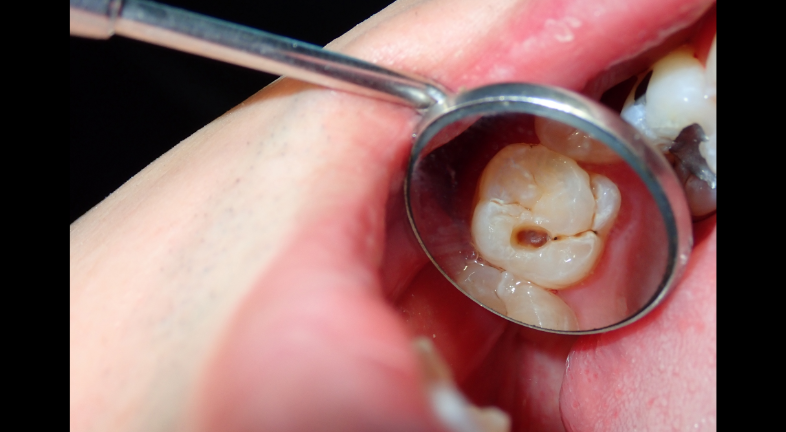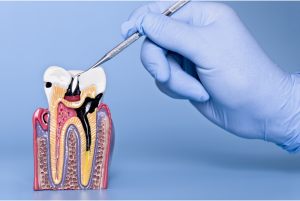
Cavities, no one can stand them. That sharp, stinging pain in your mouth when trying to enjoy a nice meal can completely ruin your day. Usually caused by a lapse in oral hygiene, cavities can vary greatly in their level of severity. Most remain asymptomatic initially, but almost always grow excruciatingly painful as the decay worsens. Considering how disruptive a cavity can be, it's reasonable to assume that plenty of people wonder, “Can cavities go away?” The answer is a resounding no; you will almost certainly need some sort of treatment once decay has turned into a cavity.
Before we get into the realities of cavities healing on their own, it's best to break down what cavities actually are. A cavity occurs when tooth decay caused by bacterial acid erosion breaks past the initial layers of enamel, creating a hole. Cavities develop in severity over the course of various stages. Typically starting as white spots on your teeth and eventually moving towards your dentin and pulp as the decay worsens.
Many online resources make exaggerated claims about natural cavity removal. The truth is, natural remedies are mostly ineffective at treating mild dental issues, let alone a full-blown cavity. Methods such as oil pulling have extremely limited evidence to back up their “cavity-reversing properties,” and most other remedies are purely preventative. Here is a brief breakdown of some of the most common myths surrounding cavity removal:
| Myth | Fact |
|---|---|
| You can reverse cavities with coconut oil or oil pulling. | Oil pulling can reduce bacteria in some cases, but it cannot repair your enamel or reverse a cavity. |
| Vitamin D reverses tooth decay. | Vitamin D can strengthen enamel, but it won't help you recover enamel that's already been eroded. |
| Brushing harder removes cavities. | Brushing aggressively can actually increase the odds of a cavity developing by damaging your enamel, and no, it can't reverse a cavity. |
| Cavities go away on their own. | You can only reverse the earliest stages of a cavity, before an actual hole has even formed. |
| If the pain stops, the cavity is gone. | The pain may have stopped because your nerve has died, but the decay itself has not stopped. |
When your oral health is at stake, you can't rely on wellness blog shortcuts; verifiable science is the only way to go. The very nature of a cavity eliminates the possibility of one going away without professional intervention. Let's break down why.

Once the outer layers of enamel have been breached, the damage has been done. Preventative measures such as remineralization can be effective in the earliest stages of tooth decay, but can't do much once a proper cavity has formed. An untreated cavity will only worsen over time, eroding your tooth down to the pulp and eventually causing it to crack and split. They can also cause some deeply unpleasant complications like dental abscesses and infections that can spread through your bloodstream, affecting your organs. Here is a breakdown of how a cavity progresses:
As you can see, advanced tooth decay cannot be easily resolved with DIY treatment or just waiting for it to pass. If your cavity is past the second stage, you must consult with a dental professional before it becomes unbearable.
If you’re still in the earliest stages of tooth decay and you’re asking yourself, “How to remove this cavity from my teeth”, you're in luck. The faint white spots caused by demineralization can be stopped or even reversed via a process called remineralization. If you’ve spotted tooth decay in the pre-cavity phase, you should:
If your enamel surface has been breached, you're unfortunately out of luck. Remineralization cannot seal that hole. Once an actual cavity has formed, you’ll most likely require a dental filling to prevent further damage.
With cavity removal being more of a complex procedure than some wellness blogs would have you believe, there are some genuinely reliable ways to stop new cavities from forming while strengthening your enamel. These methods include:
Sticking to these habits will eliminate the question of “how to get rid of a cavity,” as none will form in the first place if you're consistent.
If you think you've got a cavity, waiting for it to magically resolve itself will only make things worse. Sometimes a professional is absolutely necessary; you should schedule an appointment as soon as possible if you notice :
A dental professional can easily identify and diagnose a cavity by visually examining your teeth or via X-ray. Dentists can catch decay before it even starts to cause discomfort, which usually leads to a much simpler, cheaper, and less intrusive remedy.
To put it simply, you cannot just wait out a cavity. If the decay has breached your enamel, it isn't going anywhere until a dentist properly treats it. This does not mean that you're helpless when experiencing a cavity; it just means that prevention is your best bet.
You should be completely clear on the difference between early enamel weakness and a full-blown cavity. That clarity allows you to act before the damage cannot be reversed without expensive dental procedures. Keep up with your oral hygiene and don't be lax when it comes to brushing, flossing, or limiting sugary foods. Additionally, see your dentist as often as you can to ensure that decay isn't silently ravaging your teeth.
Cavities won't magically go away, but you don't have to let them get worse either; be proactive about your oral health.









Curated the best for your knowledge
Trench mouth, or necrotising ulcerative gingivitis, is an extremely painful and fast-developing form of gum disease. People with trench mouth often experience severe gum swelling and persistent bad breath, yet many are unaware that these symptoms point to a serious underlying oral health condition. Unless treated properly, trench mouth can worsen to the point of creating irreparable damage.
Read MoreCleaning your night guard isn’t just about keeping it looking clear. It directly affects your oral health, breath, comfort, and how long the guard lasts. A poorly cleaned night guard can quickly become unhygienic, uncomfortable, and even harmful to your gums and teeth.
Read More.webp) Can You Make a New Retainer from an Old One
Can You Make a New Retainer from an Old OneFinally, you have completed your orthodontic journey. Your braces are removed, your teeth have been straightened, and the months of wearing rubber bands, tightening, and using aligners have worked. You look in the mirror, take a deep breath, and smile; your teeth look great! But then your heart starts racing when you open your retainer case and realize it’s gone. Or even worse, your retainer is either broken, warped, or discolored.
Read MoreQuick Links

Heading